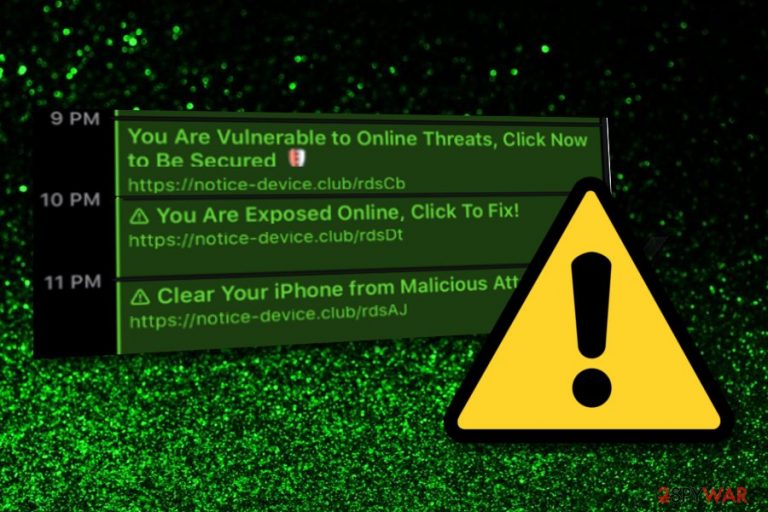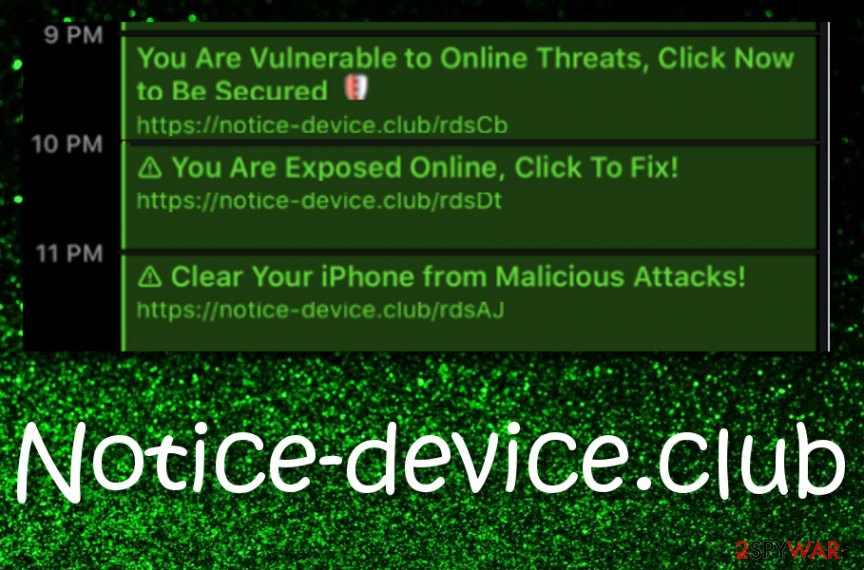Notice-device.club (Free Instructions) - Virus Removal Guide
Notice-device.club Removal Guide
What is Notice-device.club?
Notice-device.club – a form of calendar spam that is caused by a PUP and produces fake cyberattack alerts

Notice-device.club is a virus that places fake threat alerts as calendar events on Apple devices. Belonging to the Calendar virus category, this product is usually a sign of a PUP infection lurking on your mobile phone or computer. It often invades iPhone devices but can appear on macOS too. Notice-device.club virus will try to encourage you to secure, protect, and fix your computer system from non-existing malware and problems by adding questionable notifications to your calendar. Cybersecurity researchers have spotted the big popularity of these calendar viruses as there are more of them: Notice-cellphone.club, Notice-iphone.club, Alert-booster.club all of which include the same functionality.
| Name | Notice-device.club |
|---|---|
| Type | Mac virus, Calendar virus, iPhone virus |
| Cause | This rogue product can appear on your mobile phone device or computer system if there is a potentially unwanted program such as adware installed on your machine/device |
| Targets | This particular spam mostly targets iPhone users but it can also show up on other Apple devices such as iPads and macOS computers, laptops |
| Symptoms | If you have caught this infection, the first thing that you are likely to notice is your modified calendar. In the sections of events, you will see various questionable notifications that provide fake virus alerts and warnings about non-existing cyber attacks |
| Activities | However, the PUP that is hiding behind this spam can initiate a big variety of activities. You can find your web browsers such as Google Chrome, Mozilla Firefox, and Safari filled with bogus extensions, encounter frequent advertising and redirecting during browsing sessions. Also, adware is capable of collecting non-personal information by using tracking objects |
| Distribution | Potentially unwanted programs are mostly distributed by using a deceptive technique known as “bundling”. Also, you can receive this type of product by clicking on an infectious link or advertisement that you encounter on a deceptive website |
| Elimination | If you have been wondering how to get rid of the threat, we recommend completing the process automatically with the help of reliable antimalware software. However, you can also terminate the suspicious product with the help of the manual step-by-step guidelines that have been added to the end of this article |
| Fix tool | After the adware attack, you might also discover some unexpected changes in your system. If any compromisation occurs to you, try cleaning the device with FortectIntego |
Notice-device.club Calendar virus is usually provoked by potentially unwanted programs such as adware. If you are infected with this type of app, there is a big chance that you will receive even more intrusive activities that just the modification of your device's calendar.
However, first of all, you should put no trust in Notice-device.club as all the virus and damage alerts that it provides, are completely fake. We strongly recommend avoiding to click on the website links that come provided in the notifications as they can take you to unknown places some of which might be hazardous to your phone or computer.
Furthermore, the developers of Notice-device.club are likely to collect income from the provided virus alerts as they might encourage users to purchase some type of system utility that is supposed to fix all the remaining problems. The development of rogue security software is very popular nowadays and you should be aware of it.
Notice-device.club can convince you to pay an inadequate amount of money for a completely useless tool that will only take space on your device and interrupt you with odd notifications. If you are concerned about your phone's or PC's state, you should perform o thorough system scan with a reliable piece of software.
To continue, if there is adware[1] hiding in your system, you are likely to experience not only Notice-device.club spam but also some intrusive advertising during browsing sessions. The main goal of adware developers is to push as many notifications as possible and collect monetary revenue from the pay-per-click strategy.

Also, there is a big chance that you will receive changes on web browsers such as Google Chrome, Safari, and Mozilla Firefox. Adware apps are capable of interfering with sections such as the homepage and new tab URL bar. Besides, you might discover questionable extensions added too.
Furthermore, the PUP that is responsible for the appearance of Notice-device.club can start recording information about your browsing sessions and online habits. For this purpose, the app mostly includes tracking objects such as HTTP cookies[2] in the infected web browser app.
When this is done, the adware behind Notice-device.club can start tracking the websites you visit, search queries performed, clicks made on specific ads and links, saved bookmarks, your IP address, and browser type. Once such information is recorded, the developers usually pass it to other parties for monetary benefits.
If you want to end these types of questionable activities and bring your calendar back to its previous state, you will have to remove Notice-device.club together with the potentially unwanted program that is provoking its appearance. Also, you will need to do browser cleaning, otherwise, the app might reappear soon.
For Notice-device.club removal and adware termination, we recommend using reliable antimalware software, however, you can also try completing the manual guiding steps that have been included at the end of our article. Also, if your system has experienced any compromisation, try taking care of it by employing a repair tool such as FortectIntego.

Software bundling is the most common way of receiving a PUP
Getting infected with a potentially unwanted program nowadays is not an uncommon thing, so all computer users should know where they can expect such threats and what to do to avoid them properly. First of all, get introduced to the most popular PUP spreading techniques that are described below:
- Software bundling.[3] This is the most common method employed by PUP developers as it allows injecting the rogue app into an entire package of software and delivering it to computers that have Quick or Recommended settings set as default. Also, users who are likely to skip or rush downloading/installing steps are vulnerable to PUP attacks.
- Infectious ads and links. These types of components can be found anywhere on the Internet sphere, especially on third-party websites. By clicking on such content you increase the risk of getting infected with adware or another PUP.
- Fake updates. Some times developers use fake Flash Player updates to disguise their suspicious applications. By clicking on the “Update” button, you will likely launch the downloading process of the PUP.
To avoid unwanted installations, you have to pick the safest installation settings possible. We recommend choosing the Advanced or Custom configuration where you will be allowed to deselect checkmarks next to each questionable product. Furthermore, you should download reliable antimalware protection that includes the safe browsing feature and will alert if any deceptive website is waiting ahead. Finally, do not initiate any unknown software updates if you are not sure that they are original and legitimate. Go to the developer's official website and find all upgrade-related information there.
Make sure that your iPhone is virus-free
Regarding the fact that Notice-device.club belongs to both iPhone virus and Mac virus categories, we decided to provide cleaning instructions for computers and mobile phone devices too. If you are employing an iPhone and have been interrupted with advertising and redirecting activities lately, completing the following step-by-step guidelines might help you to get rid of them:
- Open the Settings option on your mobile phone.
- Select the Safari web browser icon.
- Choose the Clear History and Website Data feature.
- Close the browser window.
However, if you still find your mobile phone struggling after the Notice-device.club attack, there might be some suspicious apps installed in the system directly. Try to eliminate all unknown content by applying these steps:
- Navigate to Settings.
- Opt for General.
- Choose to Erase All Contents.
Completing Notice-device.club removal from your Mac and browsers
If you have received this spam on your Mac laptop or PC, do not worry, there are ways to get rid of it. The method that will suit you the most depends on your skills and capabilities as a user. If you think of yourself as an advanced computer user, you can go ahead and try the manual Notice-device.club removal guide that has been provided at the end of this page.
Furthermore, do not forget that the PUP might include suspicious products into your web browsers and initiate some changes to them. While dealing with the adware that is responsible for the appearance of Notice-device.club virus, you should not forget to clean and refresh web browser applications, including Google Chrome, Mozilla Firefox, and Safari.
However, if you find the manual technique to difficult for you, you can always rely on automatical removal software. Reliable antimalware tools will help you to remove Notice-device.club within a few clicks. According to cybersecurity experts from Virusai.lt,[4] it is better to use trustworthy software than risk making mistakes, otherwise, you might leave some suspicious content hanging in your computer system. This can revive the PUP.
You may remove virus damage with a help of FortectIntego. SpyHunter 5Combo Cleaner and Malwarebytes are recommended to detect potentially unwanted programs and viruses with all their files and registry entries that are related to them.
Getting rid of Notice-device.club. Follow these steps
Delete from macOS
To completely clean your Mac OS X system from bogus applications and get rid of various unknown alterings, take a look at the following guide[/GI
[GI=mozilla-firefox]
Remove items from Applications folder:
- From the menu bar, select Go > Applications.
- In the Applications folder, look for all related entries.
- Click on the app and drag it to Trash (or right-click and pick Move to Trash)

To fully remove an unwanted app, you need to access Application Support, LaunchAgents, and LaunchDaemons folders and delete relevant files:
- Select Go > Go to Folder.
- Enter /Library/Application Support and click Go or press Enter.
- In the Application Support folder, look for any dubious entries and then delete them.
- Now enter /Library/LaunchAgents and /Library/LaunchDaemons folders the same way and terminate all the related .plist files.

Remove from Google Chrome
To properly clean Google Chrome from suspicious extensions and other content the PUP has added, you should follow these instructing steps
Delete malicious extensions from Google Chrome:
- Open Google Chrome, click on the Menu (three vertical dots at the top-right corner) and select More tools > Extensions.
- In the newly opened window, you will see all the installed extensions. Uninstall all the suspicious plugins that might be related to the unwanted program by clicking Remove.

Clear cache and web data from Chrome:
- Click on Menu and pick Settings.
- Under Privacy and security, select Clear browsing data.
- Select Browsing history, Cookies and other site data, as well as Cached images and files.
- Click Clear data.

Change your homepage:
- Click menu and choose Settings.
- Look for a suspicious site in the On startup section.
- Click on Open a specific or set of pages and click on three dots to find the Remove option.
Reset Google Chrome:
If the previous methods did not help you, reset Google Chrome to eliminate all the unwanted components:
- Click on Menu and select Settings.
- In the Settings, scroll down and click Advanced.
- Scroll down and locate Reset and clean up section.
- Now click Restore settings to their original defaults.
- Confirm with Reset settings.

Delete from Safari
To keep Safari clean from adware and reverse all the unknown changes that were applied by the PUP, employ the following instructions
Remove unwanted extensions from Safari:
- Click Safari > Preferences…
- In the new window, pick Extensions.
- Select the unwanted extension and select Uninstall.

Clear cookies and other website data from Safari:
- Click Safari > Clear History…
- From the drop-down menu under Clear, pick all history.
- Confirm with Clear History.

Reset Safari if the above-mentioned steps did not help you:
- Click Safari > Preferences…
- Go to Advanced tab.
- Tick the Show Develop menu in menu bar.
- From the menu bar, click Develop, and then select Empty Caches.

After uninstalling this potentially unwanted program (PUP) and fixing each of your web browsers, we recommend you to scan your PC system with a reputable anti-spyware. This will help you to get rid of Notice-device.club registry traces and will also identify related parasites or possible malware infections on your computer. For that you can use our top-rated malware remover: FortectIntego, SpyHunter 5Combo Cleaner or Malwarebytes.
How to prevent from getting adware
Access your website securely from any location
When you work on the domain, site, blog, or different project that requires constant management, content creation, or coding, you may need to connect to the server and content management service more often. The best solution for creating a tighter network could be a dedicated/fixed IP address.
If you make your IP address static and set to your device, you can connect to the CMS from any location and do not create any additional issues for the server or network manager that needs to monitor connections and activities. VPN software providers like Private Internet Access can help you with such settings and offer the option to control the online reputation and manage projects easily from any part of the world.
Recover files after data-affecting malware attacks
While much of the data can be accidentally deleted due to various reasons, malware is one of the main culprits that can cause loss of pictures, documents, videos, and other important files. More serious malware infections lead to significant data loss when your documents, system files, and images get encrypted. In particular, ransomware is is a type of malware that focuses on such functions, so your files become useless without an ability to access them.
Even though there is little to no possibility to recover after file-locking threats, some applications have features for data recovery in the system. In some cases, Data Recovery Pro can also help to recover at least some portion of your data after data-locking virus infection or general cyber infection.
- ^ What Is Adware?. Norton. Internet Security.
- ^ HTTP cookie. Wikipedia. The free encyclopedia.
- ^ Bundled software. Computer Hope. Free computer help since 1998.
- ^ Virusai.lt. Virusai. Security and spyware news.
